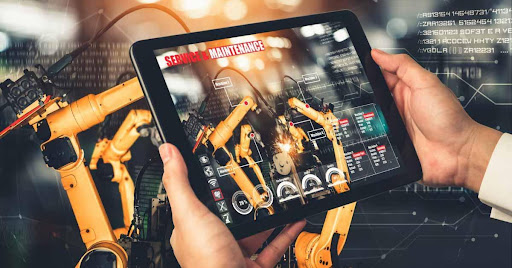
According to McKinsey, 50 percent of organizations that adopt AI in the next five to seven years will be able to double their cash flow, with manufacturing topping all industries in terms of data reliance.
Artificial Intelligence and Machine Learning in manufacturing can assist create new business prospects while also increasing inefficiency. Manufacturers are increasingly interested in studying how machine learning may help them solve specific business problems, such as tracking manufacturing failures down to specific phases in the manufacturing process, decreasing waste by recognizing problematic components early in the process, and so on.
Benefits
- Predictive Maintenance
Machine learning allows for predictive maintenance by predicting equipment faults ahead of time, scheduling a timely repair, and reducing downtime. Instead of dedicating money to scheduled maintenance, manufacturers spend far too much time addressing faults. Machine learning algorithms have a 92 percent accuracy rate in predicting equipment failure, helping organizations to better plan their maintenance plans and improve asset reliability and product quality. According to studies, applying machine learning and predictive analytics raised overall equipment efficiency from 65 percent to 85 percent.
Quality Control
Product inspection and quality control are also aided by machine learning models. Computer vision algorithms based on machine learning can learn from previous data to discern good from bad products, automating the inspection and monitoring process. These algorithms just require good examples in their training set, eliminating the need for a library of potential flaws. On the other hand, an algorithm that compares samples to the most common types of flaws can be created. AI & Machine learning can help manufacturers save money on visual quality control. Machine learning-based automated quality testing, according to Forbes, can enhance detection rates by up to 90%.
Logistics and Inventory Management

To conduct the complete manufacturing process, the manufacturing business requires considerable logistics capabilities. Several logistics-related processes can be automated using machine learning-based solutions, increasing efficiencies and lowering costs. Manual, time-consuming procedures such as logistics and production-related documentation are expected to cost the average US business $171,340 per year. Machine learning can automate these mundane processes, saving thousands of man-hours each year. Machine learning algorithms can also be used to improve resource management; for example, using DeepMind AI, Google was able to cut its data center cooling expense by 40%.
Product Development
One of the most common applications of machine learning is product creation. To achieve the greatest results, both new product design and existing product improvement require substantial data analysis. Machine learning solutions can assist in the collection and analysis of massive amounts of product data to better understand consumer demand, detect defects, and unearth new business prospects. This can aid in the improvement of current product designs as well as the development of new items that can provide new revenue streams for the company. Companies can lessen the risks involved with developing new goods by making better-informed decisions based on improved data.
Cybersecurity
To function properly, AI and ML solutions rely on networks, data, and technological platforms — both on-premise and in the cloud. The security of these systems and data is vital, and machine learning can help by restricting access to important digital platforms and data. Individual users’ access to sensitive data, the applications they use, and how they connect to it can all be streamlined with machine learning. This can help businesses protect their digital assets by immediately recognizing irregularities and taking appropriate action.
Robotics
Human labor is still heavily used in modern manufacturing. However, factory automation is increasing, as robots can already undertake many difficult activities, except for a few sectors that require extremely high precision, which can only be provided by human professionals. In the future, robots that are flexible enough to collaborate with humans could take over a large portion of manufacturing. They’ll be able to operate in a wide range of conditions with little human intervention. Advanced machine learning techniques can be used in robotics to assist manufacturers design sophisticated strategies and manufacturing processes.
Bottom Line
Machine learning may help firms optimize their whole manufacturing process and decrease waste by harnessing the power of data. AI & Machine learning will continue to improve and become more sophisticated in the manufacturing industry, thus it will play an even bigger role in the future.




